SOCIAL INNOVATION
The Problem
Diabetes is a major concern globally, particularly in countries like the Philippines. The International Diabetes Federation shared alarming statistics: around 536.6 million people, or 10.5% of adults between 20 and 79 years old, were living with diabetes in 2021 (Sun et al., 2022). The future looks even more daunting, with an estimated 783.2 million people expected to be affected by 2045. This issue disproportionately impacts poorer nations and the elderly, especially those between 75 and 79 years old, facing a diabetes prevalence rate of 24%. In the Philippines, diabetes was the 5th leading cause of death from January to December 2021, underscoring the urgency of this issue (Girón & De La Vega, 2022).
In a seminar called “Feeding Metro Manila in 2050: Promoting Responsible Consumption to Address Unhealthy Eating Preferences of Consumers” organized by the National Academy of Science and Technology (NAST) way back in 2021, it was emphasized that unhealthy lifestyle leads to illness and non-communicable diseases such as diabetes. Aside from health risks, this also leads to additional health expenditures, economic losses, and death. Cities such as Quezon City are no exception due to high volumes of fast food consumption. Mediation efforts have been made such as in 2017, the Anti-Junk Food and Sugary Drinks Ordinance aimed to plant the seed of reducing non-communicable diseases by banning the selling of junk food within a 100-meter radius of school premises. Many more have been implemented since then such as free risk screening, laboratory workup, nutritional counseling, zumba exercise, prescriptions, and medicine for health beneficiaries (Rasco, 2022).
However, in a study back in 2021 involving the data of 1378 people in the National Kidney and Transplant Institute based in Quezon City, the patients with type 2 diabetes who have poor control of their diseases incurred a total cost of about Php 37,000 annually and about Php 31,000 to those with good control. This amount corresponds to medications, testing kits, medical checkups, and laboratory tests that diabetic patients use on a year-round basis (Jimeno et al., 2021). This is a huge portion of the household income considering the wage in Metro Manila.
Financial problems are already a huge burden but other important problems also need to be addressed: the patient’s physical and emotional aspects in managing this disease. Diabetes is a chronic disease that greatly takes a toll on the physical health of the person; it causes problems with mobility, seeing, and physical healing tVitalRadar stands as a pioneering force in the digital health domain, specifically designed to tackle the escalating challenge of lifestyle diseases, specifically diabetes, which are deeply influenced by day-to-day lifestyle choices.
The specific problems we want to solve regarding diabetes management are:
1. Diabetes management requires on-time and consistent monitoring of glucose level everyday every after meal.
2. Traditional glucometers aren’t built with capability to sync with existing software platforms that are for managing diabetes.
3. There is a lack of knowledge in accurately interpreting their current health condition.
Our Solution
Our startup introduces BuddyBetes by VitalRadar, a digital health website application platform designed to transform the way patients and caretakers manage lifestyle diseases, with a particular focus on diabetes.
BuddyBetes stands as a pioneering force in digital health, specifically designed to enhance diabetes management and contribute to SDG 3: Good Health and Well-being. By simplifying the monitoring of glucose levels through Optical Character Recognition (OCR), analytical dashboards, and digital health logs, BuddyBetes enables proactive health interventions, reducing the risk of diabetes-related complications and improving overall health outcomes. This proactive approach aligns perfectly with the goal of ensuring healthy lives and promoting well-being for all at all ages.
Furthermore, BuddyBetes addresses SDG 10: Reduced Inequalities by providing an affordable and accessible platform that reaches underserved populations, particularly in rural and economically disadvantaged areas. The technology ensures that all patients, regardless of location or economic status, have equal access to personalized and informed healthcare services, reducing disparities in health access and outcomes.
To measure the impact of BuddyBetes, we propose tracking pre- and post-intervention access to diabetes management tools and medications, particularly focusing on increases among populations in rural or underprivileged areas. Health outcome metrics, such as reductions in diabetes-related complications and hospital admissions, will directly demonstrate the benefits of improved disease management. Additionally, user adoption rates and stakeholder feedback from patients, doctors, pharmaceutical companies, and insurance providers will offer both quantitative and qualitative data on the platform’s effectiveness and areas for improvement.
By integrating these strategies, BuddyBetes not only aligns with these critical SDGs but also sets a benchmark for measuring its impact, ensuring that health improvements are both significant and sustainable.
Video Presentation
Tip: Watch in HD for the best viewing experience
You may view our pitch deck here.
Campaign Performance & Support Received
A. Surveys/Interview
We have conducted surveys and interviews to patients/caretakers and healthcare professionals since late 2023.
You may view our anonymized 2023 survey results here: Patients/Caretakers and Healthcare Professionals.

You may view our other fieldwork evidence PDF related to the market/user interview here.
B. UI/UX Design and Proof of Concept
Our team has designed the initial UI/UX design for the patient and doctor side of the application.
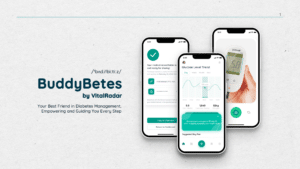
Additionally, we have laid out our proof of concept via Looker Studio for testing out the idea to few target users.
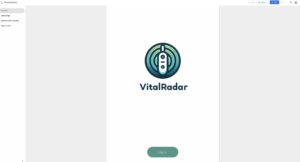
C. Seed Funding from Previous Competitions
(1) Project Set
Project SET: Scholars Entrepreneurship Training, is a training program that was implemented through the collaboration efforts of the Philippine Department of Science and Technology – Science Education Institute (DOST-SEI), and the Leave a Nest Group. It is a 10-month training program for DOST-SEI scholars that aims to equip them with the researcher-entrepreneur mindset, and make sure that their ideas for solutions to Philippine issues become clear as the program progresses.
Our team won the following awards:
(1) VISIONARY AWARD (PHP 150,000 seed funding) and,
(2) BLUE NEST AWARD (Six (6) months free incubation at the Ateneo Blue Nest)
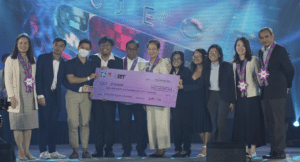
You may view the article about the Project Set competition here.
(2) QCOMPETE 2024
QOMPETE 2024 Showcase and Awarding! is the culmination of QBO Innovation Hub’s annual intercollegiate technopreneurship competition as they crown the Top 3 teams. With over 300 applications received from 68 schools nationwide, the journey has been intense for the top 50 teams hailing from Luzon, Visayas, and Mindanao. After rigorous training and screening, only the top 10 teams remain to compete for the grand prize.
Our team bagged 1st runner up with PHP 20,000 seed funding.
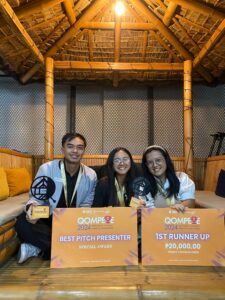
You may view the QOMPETE 2024 Showcase and Awarding livestream here.
D. Partnership
Our team recently partnered with UP Innovation Leaders’ Hub for their event 𝐘𝐨𝐮𝐭𝐡 𝐈𝐧𝐧𝐨𝐯𝐚𝐭𝐢𝐨𝐧 𝐁𝐨𝐨𝐭𝐜𝐚𝐦𝐩 𝟐𝟎𝟐𝟒: 𝐒𝐡𝐚𝐩𝐢𝐧𝐠 𝐌𝐢𝐧𝐝𝐬, 𝐔𝐧𝐥𝐞𝐚𝐬𝐡𝐢𝐧𝐠 𝐁𝐫𝐞𝐚𝐤𝐭𝐡𝐫𝐨𝐮𝐠𝐡𝐬! We were one of their Innovation Partners.

You may view the facebook post here.
E. Features and Talks
(1) Our team was invited to share about our business idea during the 3rd Anniversary of Leave a Nest PH last March 11, 2024 at the Prestige Tower, Ortigas Center, Pasig City together with all its local and international partners from the academe, government, corporate, and startups.
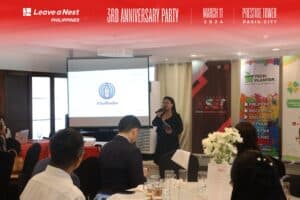
It was also celebrated together with representatives from both Japanese and Filipino agencies, companies, universities, student groups, and startups, especially with the presence of partners from the DENR-Mines and Geosciences Bureau, Philippine Space Agency, Japan External Trade Organization Philippines, Marubeni Philippines Corporation, The Ogaki Kyoritsu Bank, Ltd, Photonergy, De La Salle University, Adamson University, UP Manila and many other important ecosystem builders.
You may view the post of Leave a Nest Group posted about the event here.
(2) The UP Parser (1.6K followers) is the official student publication of the Department of Computer Science, University of the Philippines Diliman. The CEO of VitalRadar, Cess, was featured in one of their feature articles.
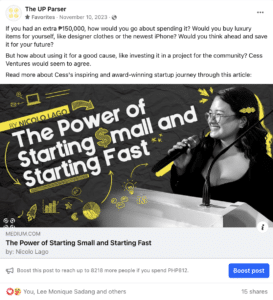
You may read through the article here.
(3) The CEO of VitalRadar, Cess, was invited to be one of the speakers for Startup, 1-Up: The Student Founder Journey at UP CS Week.
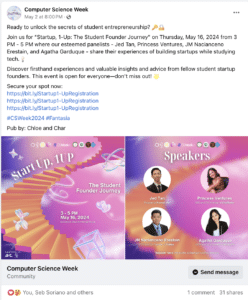
You may view the link of the facebook post here.
References
Girón, M., & De La Vega, S. a. F. (2022). Prevalence of Diabetes among Community-Living Older Persons in the Philippines: the FITForFrail study. Journal of the ASEAN Federation of Endocrine Societies, 37(2), 23–27. https://doi.org/10.15605/jafes.037.02.15
Jimeno, C., Sy, R. A., De La Pena, P., Cipriano, C., Tan, R., Panelo, A., & Ng, J. (2021). Direct medical costs of type 2 diabetes mellitus in the Philippines: findings from two hospital databases and physician surveys. BMJ Open, 11(10), e049737. https://doi.org/10.1136/bmjopen-2021-049737
Rasco, E. T. (2022). Feeding Metro Manila in 2050: A Food System Vision. Transactions of the National Academy of Science and Technology/Transactions of the National Academy of Science and Technology, 42(2020), 1–8. https://doi.org/10.57043/transnastphl.2020.2305
Sun, H., Saeedi, P., Karuranga, S., Pinkepank, M., Ogurtsova, K., Duncan, B. B., Stein, C., Basit, A., Chan, J. C., Mbanya, J. C., Pavkov, M. E., Ramachandaran, A., Wild, S. H., James, S., Herman, W. H., Zhang, P., Bommer, C., Kuo, S., Boyko, E. J., & Magliano, D. J. (2022). IDF Diabetes Atlas: Global, regional and country-level diabetes prevalence estimates for 2021 and projections for 2045. Diabetes Research and Clinical Practice (Print), 183, 109119. https://doi.org/10.1016/j.diabres.2021.109119




